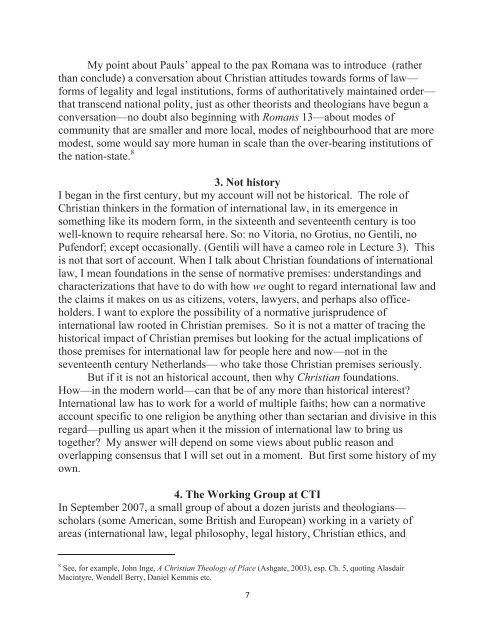International Legal Evangelism: Intelligence, Reconnaissance & Missions
International Legal Evangelism: Intelligence, Reconnaissance & Missions
International Legal Evangelism: Intelligence, Reconnaissance & Missions
Create successful ePaper yourself
Turn your PDF publications into a flip-book with our unique Google optimized e-Paper software.
My point about Pauls’ appeal to the pax Romana was to introduce (rather<br />
than conclude) a conversation about Christian attitudes towards forms of law—<br />
forms of legality and legal institutions, forms of authoritatively maintained order—<br />
that transcend national polity, just as other theorists and theologians have begun a<br />
conversation—no doubt also beginning with Romans 13—about modes of<br />
community that are smaller and more local, modes of neighbourhood that are more<br />
modest, some would say more human in scale than the over-bearing institutions of<br />
the nation-state. 8<br />
3. Not history<br />
I began in the first century, but my account will not be historical. The role of<br />
Christian thinkers in the formation of international law, in its emergence in<br />
something like its modern form, in the sixteenth and seventeenth century is too<br />
well-known to require rehearsal here. So: no Vitoria, no Grotius, no Gentili, no<br />
Pufendorf; except occasionally. (Gentili will have a cameo role in Lecture 3). This<br />
is not that sort of account. When I talk about Christian foundations of international<br />
law, I mean foundations in the sense of normative premises: understandings and<br />
characterizations that have to do with how we ought to regard international law and<br />
the claims it makes on us as citizens, voters, lawyers, and perhaps also officeholders.<br />
I want to explore the possibility of a normative jurisprudence of<br />
international law rooted in Christian premises. So it is not a matter of tracing the<br />
historical impact of Christian premises but looking for the actual implications of<br />
those premises for international law for people here and now—not in the<br />
seventeenth century Netherlands— who take those Christian premises seriously.<br />
But if it is not an historical account, then why Christian foundations.<br />
How—in the modern world—can that be of any more than historical interest?<br />
<strong>International</strong> law has to work for a world of multiple faiths; how can a normative<br />
account specific to one religion be anything other than sectarian and divisive in this<br />
regard—pulling us apart when it the mission of international law to bring us<br />
together? My answer will depend on some views about public reason and<br />
overlapping consensus that I will set out in a moment. But first some history of my<br />
own.<br />
4. The Working Group at CTI<br />
In September 2007, a small group of about a dozen jurists and theologians—<br />
scholars (some American, some British and European) working in a variety of<br />
areas (international law, legal philosophy, legal history, Christian ethics, and<br />
<br />
8 See, for example, John Inge, A Christian Theology of Place (Ashgate, 2003), esp. Ch. 5, quoting Alasdair<br />
Macintyre, Wendell Berry, Daniel Kemmis etc.<br />
<br />
7

















